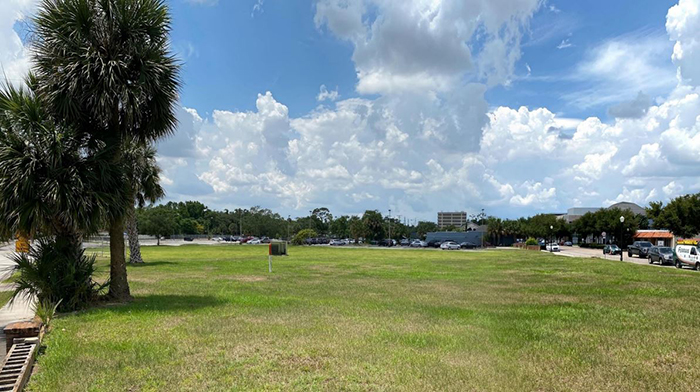
by Anne Mooney | Aug 16, 2021 | Zoning and Development
“What If there Were No Buildings?”
Progress Point Park Gets Thumbs Up – No RFP
by Anne Mooney / August 16, 2021
Kicking off yet another discussion at the August 11 Commission meeting of what to do with Progress Point, Mayor Phil Anderson posed the question, “What if there were no buildings?”
Will there be an RFP?
While the agenda item for last Wednesday’s meeting referred to a “Continuation of Progress Point & Potential RFP,” this Commission finally heard the question: What IF there were no buildings? As Commissioners discussed the possibilities at Progress Point, the question of the Request for Proposal (RFP) and built structures took a back seat to the desire for open green space and the need for parking for existing businesses in the area.
Commissioner Todd Weaver explained that the Commission agreed to limit future buildings on Progress Point to 9 percent Floor Area Ratio (FAR) – which translates to about 14,000 square feet on two floors. “We didn’t go out with an RFP,” said Weaver, “because if the current parking needs for existing businesses are met, there is no space for parking an additional 14,000 square feet of commercial space without building a parking garage.”
There will be no RFP and no buildings on Progress Point Park – at least, not for now.
Progress Point has a bit of history
For years, discussions leading up to Wednesday night’s meeting had to do with what could or should be built on Progress Point, an oddly shaped piece of property the City acquired in a controversial 2011 land swap in which the City traded to CNL Bank the large rectangular parcel across from the new Library-Events Center at the northwest corner of Denning Dr. and Morse Blvd. for the scruffy plot down by the railroad tracks on South Denning. The parcel on Denning and Morse, once home to the old State Office Building, now boasts a shiny new building full of Class A office space. Progress Point is looking better, too, since uninhabitable buildings were cleared and the grass is cut regularly.
Natural Environment vs. Built Environment
Plans for Progress Point, which until now were all about the so-called ‘built environment,’ stalled when the Orange Avenue Overlay (OAO) ordinance was rescinded. A recent citizen petition with more than 500 signatures called for the City to ‘Keep It [Progress Point] Green.’ Petition organizers pointed out that of the four options for Progress Point previously presented by City planners, not one was a park – a natural environment as opposed to a built environment. The possibility of putting just a park there, with no buildings in it, had not been considered.
Phased Organic Approach
On August 11, the Commissioners gave Progress Point that consideration. Commissioner Carolyn Cooper urged her fellow Commissioners to adopt what she called a phased, organic approach. “We should slow this process down,” said Cooper. “Let’s take care of the park, the storm water treatment, realign Palmetto Avenue, build the bike and pedestrian path and make sure there is adequate parking for the existing businesses.”
Enter Orange Avenue Merchants Association
Once the park is in place, said Cooper, the Commission should support the Orange Avenue merchants in their efforts to activate the park. “Give them a chance to take ownership,” she said, “and see what they want the park to be.”
Progress Point becomes a park
For the time being, Commissioners agreed to build a park with paths and large mature shade trees. Park amenities will include the realignment of Palmetto Avenue closer to the railroad tracks, which will increase space for parking, green space and a bike and pedestrian path. Decorative lighting will be installed for safety and aesthetics along paths and in parking lots. Approximately 120 parking spaces will be provided for park users and existing businesses, and parking will be free of charge. No decision has been reached about City funding for a park maintenance building or restrooms for park users, but discussion of these amenities is ongoing.
OAO completion scheduled for late November – early December 2021
The Orange Avenue Overlay ordinance is tentatively scheduled for a second and final reading in late fall of this year. There is cautious optimism that ongoing litigation between the City and major landowners Demetree and Holler will wind up, and the OAO will finally become a reality.
City Planning and Transportation Director Bronce Stephenson estimates that tree planting in the park could begin as soon as December 2021, and that park plans would be completed for Commission approval by first quarter 2022.
Green space with paths and shade trees located midway between two potentially high-density developments will give residents respite. As one citizen commenter observed, “We don’t need to activate the park; we need the park to activate the corridor. Imagine what Park Avenue would be without Central Park.”
To comment or read comments from others, click here →
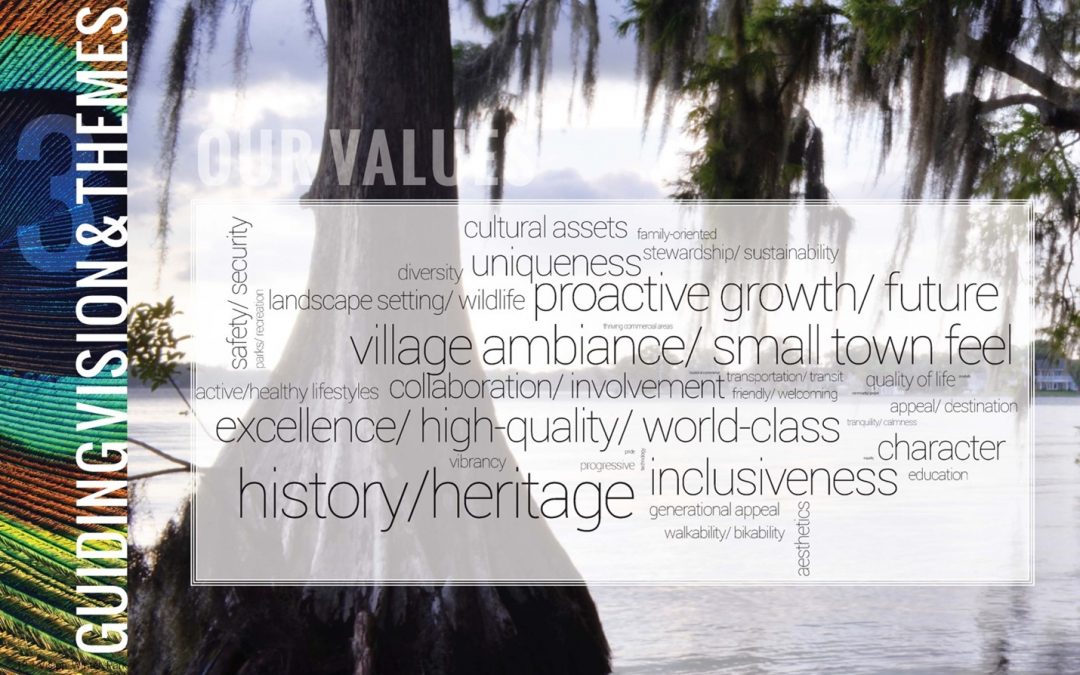
by Anne Mooney | Aug 6, 2021 | News
Open Letter to Mayor & Commissioners
Keep It Green!
by Guest Columnist Charley Williams / August 6, 2021
I invite this commission to put on their long-range visioning glasses and gaze five to ten years into the future — though many would say that falls short of “long-range.”
Orange Avenue Overlay will evolve
In 2030 I envision Orange Ave. as a walking mall, with no cars but plenty of cafes and other dining options. In fact, the OAO could evolve into a second downtown. If large property holders move forward we could have a hotel with outdoor seating, food and music.
Should the Jewett holding be sold to a retail development arm, we could have an entertainment zone as an anchor. Time will tell. Significant property ownership transfers are already underway.
Evolution requires green space
These pressures bring into sharp focus the need for passive, quiet green space, not just for existing neighborhoods in the immediate vicinity, but also for the tenants of new condo and rental properties still in the planning phases.
Link in the Emerald Necklace
Let’s zero in on the 4.5 acres at Progress Point — a logical keystone in the evolving ‘green necklace’ of the pedestrian-bike trail that will connect Mead Garden with Denning with MLK, Jr. Park and beyond. Progress Point is the poster child for how that plan can emerge and blossom. It’s a brand identifier for our community.
What do citizens want on Progress Point?
The question now is on asset development of the Progress Point real estate. What do citizens want? We’ve heard references to retail space ranging from 7,000 to 13,000 square feet to upwards of 40,000 square feet—the size of a Publix. But none of these recommendations came from residents.
We run the risk of setting up an East End Market scenario, which often turns into a drive-by because there is overtaxed parking capacity and a plethora of ‘attitude’ signs from the neighbors warning against illegal parking.
Original purpose of Overlay was to benefit existing business
How do you control noise and congestion with a micro-brewery and rooftop live music after the sun goes down? Not to mention overflow parking and traffic pressures for the immediate nearby neighborhoods and parking displacement for the existing businesses on the avenue. Wasn’t that the original objective to begin with – to protect and benefit the existing businesses? Why the mission drift?
Are you putting residents first?
What’s now being proposed can totally change that neighborhood character. Is this what this Commission wants to be saddled with—when many of your campaigns promised to put residents first?
A 14,000-square-foot venue drives the need for more parking. Why do that? We have already identified parking as a priority service for existing businesses. Let’s address the needs of existing Orange Avenue businesses first, before taking any action on new development.
Test your assumptions with the voters
To date, the Commission has spent months putting crayon marks on a Progress Point master plan, but not once have they invited citizen input.
There is no other existing Winter Park park with a retail component within its boundaries.
How about a Pilot Program
One possible compromise would be to pilot the micro-retail experiment first with Cady Way Trail and Showalter Field to give cyclists, joggers and sports enthusiasts options for food and drink. There is a much larger park footprint to work with there.
How has this commission changed from the last one?
Many of us watched as two structures ate up 26 percent of MLK, Jr. Park and occasioned the removal of over 50 mature trees that provided much-needed shade. One result of that long and torturous fight was the demonstration of the will of the citizens to change the direction of the Commission. At least now, there is not a four-story office building with associated parking structure of equal size slated for Progress Point.
Keep it green!
But it’s time to swing the pendulum further. Keep what we have green and start looking for more future sources of open greenspace.
To comment or read comments from others, click here →
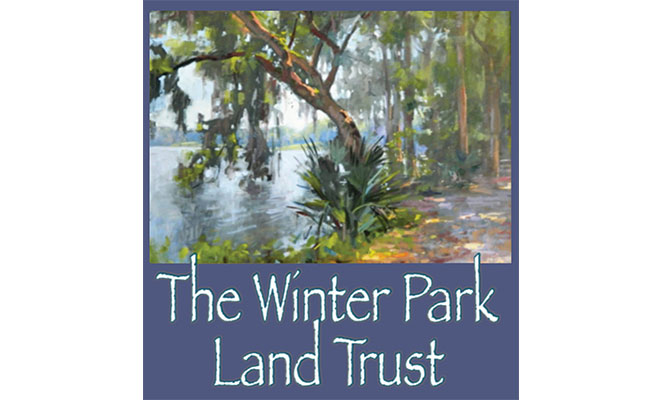
by Anne Mooney | Jul 18, 2021 | Uncategorized
WP Land Trust on Progress Point
Recommendations to the WP City Commission
by Guest Columnist Bob Bendick / July 18, 2021
 Land Trust Mission
Land Trust Mission
The Winter Park Land Trust is a non-profit organization managed by a volunteer citizen board of trustees. The mission of the land trust is to plan, help finance, and manage the acquisition of land and interests in land to be used for the creation, expansion, improvement, and connecting of parkland and green space within and adjacent to the City of Winter Park.
Land Trust Vision
Our vision is that the Land Trust will help to ensure that Winter Park and surrounding communities will be an area with sufficient parks and open space, where the footprint of existing parks will be increased, and wherever possible, parks and green spaces will be connected in order to balance and reduce the adverse impacts of increasing development and population density. Attractive green space will then always be an important asset and characteristic of the Winter Park area.
The Winter Park Land Trust Board has followed the discussions concerning the design and configuration of a park at the Progress Point property. The Land Trust Board met on July 12, 2021, and adopted recommendations concerning Progress Point.
On July 12, 2021, the Land Trust board of trustees wrote to the City Commission:
The Winter Park Land Trust recommends that the City of Winter Park maximize the amount of land devoted to greenspace in the Progress Point parcel and that it connects that greenspace through walkways and bikeways with other city parks and open spaces. Toward that end, we recommend that the city should:
- Begin immediately to design and build a 1.5 to 2.0-acre park at Progress Point and the greenway connecting that site to Mead Garden and designate that land as a park in the city’s comprehensive plan.
- Design the park to be part of the larger greenways system described below.
- Restrooms are an appropriate use of park land.
- Seek funding to enhance the greenway connection between the Progress Point site and Martin Luther King Park and to create a new Greenway link between M.L. King Park along Morse Avenue to Central Park. A short connection between M.L. King and the Winter Park Community Center would also be desirable as is the connection between Progress Point and the Winter Park Tennis Center.
- Reserve decisions on the use of the balance of the Progress Point land until the Orange Avenue Overlay plan is completed and there is a sense of likely additional private development in the area with the objective of maximizing the creation of greenspace including through tree planting, usable open space and pedestrian-friendly walkways.
- Complete the design of the Progress Point Park such that it:
- Includes ample use of large shade trees;
- Emphasizes pedestrian and bicycle access;
- Is safe for users including children, considering the adjacent street and railroad tracks;
- Uses materials consistent with those historically used in Winter Park;
- Is durable and practical to maintain.
- Proceed with updating the City’s Parks Plan as a guide to future park development.
Bob Bendick is a founding member of the Winter Park Land Trust Board of Trustees.
To comment or read comments from others, click here →

by Anne Mooney | Jul 15, 2021 | News
Free Vaccinations at the Farmer’s Market
Saturday, July 17 & Saturday August 7
by Anne Mooney / July 15, 2021
The City of Winter Park is partnering with the Orange County Health Department to provide COVID-19 vaccinations at the Farmer’s Market this Saturday, July 17th. Vaccinations are available free of charge to Winter Park residents and guests 12 years of age and older.
Free grocery coupons for the first 50
The first 50 people to receive a vaccination will also receive a $10 grocery coupon.
Pfizer and Johnson & Johnson vaccines available
On Saturday, July 17, Health Department personnel will be offering first doses of the Pfizer vaccine. They will also have limited quantities of the single-dose Johnson & Johnson vaccine. If you get there early, you can choose which you want to receive. The City of Winter Park will have standby medical personnel on site.
Second Pfizer doses available August 7
On Saturday, August 7, medical personnel will administer for 2nd doses of the Pfizer vaccine and will, again, have limited amounts of the single-dose Johnson & Johnson vaccine.
“So far we’ve received a lot of positive feedback,” said Fire & Rescue Chief Dan Haggedorn. “It couldn’t get better or easier.”
Winter Park Mayor Phil Anderson said, “We are happy to partner with the Florida Department of Health in Orange County to bring vaccinations to our community. We want to make it as easy as possible for everyone to protect themselves during the challenges we’re experiencing with COVID-19.”
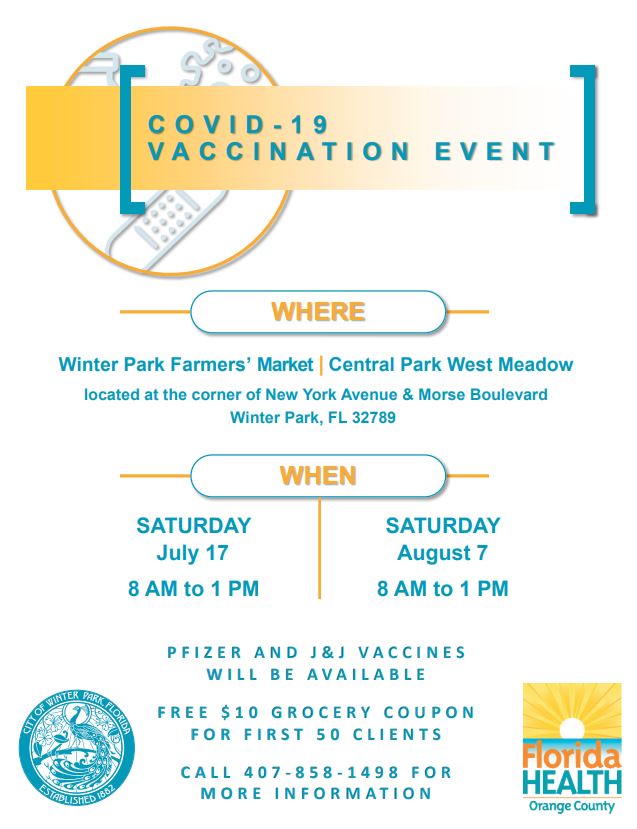
To comment or read comments from others, click here →
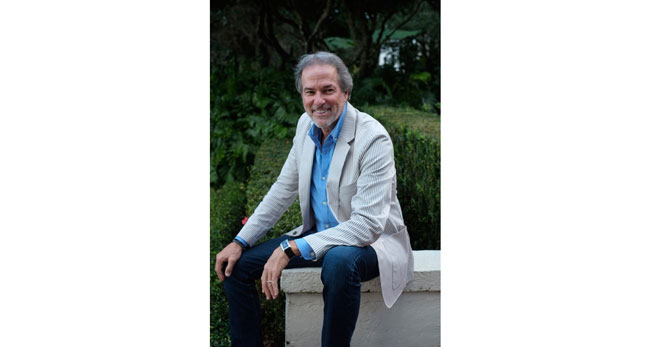
by Anne Mooney | Jun 29, 2021 | News
Randall Robertson Takes Over Winter Park Institute
Winter Park Institute to Find New Home at the Library-Events Center
by Anne Mooney / June 29, 2021
Effective July 1, Randall B. Robertson will become owner and executive director of the popular Winter Park Institute (WPI). WPI, the speaker series that has brought many celebrities to Winter Park, was created by Rollins College in 2007. WPI hosted speakers such as Maya Angelou, Ken Burns, David McCullough, Jane Pauley, Itzhak Perlman, Gloria Steinem and Winter Park’s very own 2-term U.S. Poet Laureate Billy Collins.
The Institute ceased operation last year when the COVID-19 pandemic put a halt to live events. In order to keep the program alive, Winter Park Publishing Company (WPPC), owner of Winter Park Magazine, took over the Institute’s operation during lockdown.
WPPC conducted two virtual events during 2020, with the goal in mind of finding community partners as the pandemic receded and live events could return. At the top of the list of possible partners was Randall Robertson, who for the past 12 years has operated Gladdening Light, a Winter Park-based non-profit that sponsored an annual symposium that drew speakers and attendees from all over the U.S.
“The more I talked to Mr. Robertson, the more it became obvious that to ensure the continuity of WPI in a way that honors its tradition and delivers what Winter Park residents expect, he should be the person to run it,” said Winter Park Magazine editor and publisher Randy Noles. “Happily for everyone, he was at once committed and enthusiastic.”
Robertson said he is a long-time fan of WPI because it provided a forum for citizens “to hear from thought leaders in the public square, challenging us to stretch our thinking.”
“We want to continue attracting visionaries and extraordinary people from the arts and humanities, the sciences and literature, to advance public themes in education, society, the economy and politics,” said Robertson.
Robertson, himself a WPI speaker in 2012, said the new Winter Park Public Library and Events Center will be WPI’s official home, and that most of its events will be in one of the venues at the complex. “The Institute represents a beautiful opportunity to showcase Winter Park to the world,” he said.
To comment or read comments from others, click here →








Recent Comments